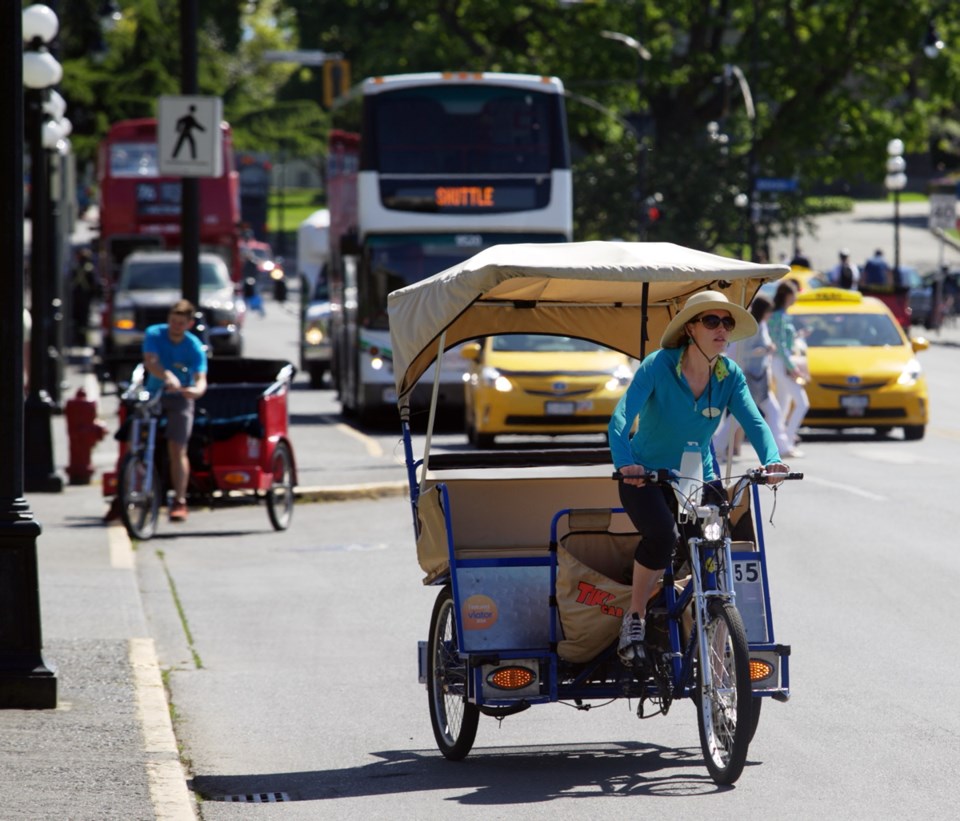Victoria city councillors will consider taking the cap off the number of pedicabs that can operate in the city.
“I think the current bylaw provisions are completely outdated. They reflect a period when we thought pedicabs were bad and the public should be protected from this form of transportation,” Coun. Ben Isitt told council, adding that a restriction on pedicab numbers reflects “a focus on automobility.”
“I don’t think pedicabs are a problem,” Isitt said.
Councillors have been under pressure to boost the number of pedicab licences by those who want to get into the business.
Council has been considering a staff recommendation to increase the number of licensed pedicabs to 35 from the existing 28.
City staff say determining the appropriate number of licences in a marketplace is an inexact science and that a number of factors have to be considered, including market demand and infrastructure capacity. Vancouver allows 60 licences.
Last week, councillors asked staff to report back in two weeks on the ramifications of lifting the cap.
Licences are now under the control of Andrew Capeau, president and owner of Victoria Pedicab Company.
Victoria Pedicab has eight licences and manages the remaining 20 licences through Pacific Pedicabs (five licences) and Kabuki Kabs (Victoria) Ltd. (15 licences).
Capeau contends the existing market could absorb another four licences. While he expects all 28 pedicabs to be on the street during what’s anticipated to be a busy tourist season this summer, that’s not always been the case. The number of pedicabs on the street dropped to 18 in 2013, but increased steadily to 25 last year.
Isitt argued council should remove the restriction on numbers and allow the market to decide.
“We’re basically artificially restricting entrepreneurship and we’re restricting choice for visitors and members of the public,” Isitt said.
Coun. Geoff Young said taking off the cap is not necessarily the wrong move, but one of the ramifications is that the city would have to take on the role of licensing and policing operators.
“What happens with a single industry is the owner of the licence does the regulating. If you’ve got a bad operator — somebody who breaks the rules, overcharges or continues to drive on the sidewalk — he’s out of a job the next day,” Young said. If anyone can get a licence, it will be up to the city to investigate complaints, he said.
Coun. Charlayne Thornton-Joe worried an excess of pedicabs might result in aggressive tactics to get customers.
“I can consider supporting it, but I’m not sure if I can support that there be no restriction at all,” she said.
But Coun. Jeremy Loveday said taking the restrictions off “will end the monopoly” and allow entrepreneurs to take a shot at running pedicab operations.
“I think that’s what we want to see,” he said. “I don’t think it will create chaos.”
There’s no question others want a crack at the Victoria marketplace.
Steve Craik proposed that if councillors were to allow seven more licences, Victoria Pedicab should be limited to 20 licences — 57 per cent of the market share. “A 20 cap would give new entrepreneurs a fighting chance,” he said.



